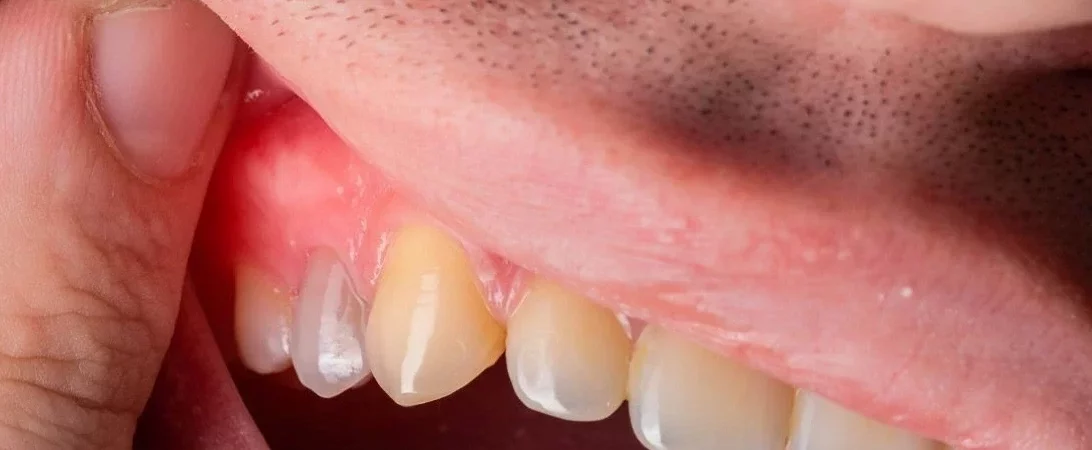Last Updated on: 8th December 2025, 10:45 am
The human body has developed multiple strategies to defend itself against infections. One of them is the formation of granulomas. In this article, we will tell you everything you need to know about dental granulomas.
What is a Dental Granuloma?
A dental granuloma is a benign (non-cancerous), slow-growing mass composed of immune cells that forms when the body tries to isolate foreign substances that it has not been able to eliminate. These substances can be infectious microorganisms or foreign materials.
The term dental granuloma usually refers to an inflammatory lesion of the tissue that surrounds and supports the root of teeth, typically located at the end or apex of the root. Dentists often refer to it as periapical granuloma because it is found in the tissues surrounding the apex (tip of the root) of the tooth.
What Causes Periapical Granuloma?
Periapical granuloma is caused by an infection that is located inside the tooth, usually a necrotic pulp. The pulp is the soft tissue inside the tooth that contains cells, blood vessels, and nerve fibers. This tissue can die when there is strong or prolonged aggression, such as deep cavities or trauma. When the pulp dies, dentists refer to this as pulp necrosis.
Teeth are connected to the rest of the body through the apical hole, through which nerves and blood vessels from the pulp exit. This hole is located at the end of the dental root. If the infection inside the tooth is not resolved (usually through root canal treatment), the bone surrounding the root tries to defend itself and forms a periapical granuloma.
What are the Symptoms of a Dental Granuloma?
Usually, periapical granuloma is slow-growing, so there are no symptoms. Occasionally, the patient may perceive a different sensation when chewing, but this is not usually associated with pain. However, with slight changes or stimuli in the area that could promote bacterial growth, the process could become acute, causing a lot of pain and, in some cases, severe inflammation.
How is Periapical Granuloma Diagnosed?
Most patients do not experience symptoms that lead them to seek dental attention, so it is generally identified through routine X-rays or by noticing that the tooth is not sensitive to changes in temperature.
Bone loss around the dental root can be observed on the X-ray. However, this finding can be compatible with two pathologies: periapical granuloma or periapical cyst, so a definitive and accurate diagnosis may require a surgical biopsy to study the tissue.
Nevertheless, performing a biopsy is not usually the first option because the initial treatment for either of the two growths (granuloma or cyst) is the same: root canal treatment. Therefore, most professionals refer to this finding interchangeably as “chronic apical periodontitis.”
Can I treat it at home?
To eliminate an infection, it is always necessary to remove the cause of it. That is to say, there are no home remedies or medications that can solve the infection on their own. It is not advisable to take antibiotics without a prescription because they do not eliminate the root of the problem, only mask it, and also make the bacteria more resistant.
When dealing with a dental or periapical granuloma, it is best to consult with an oral health professional who will explain the most appropriate options for eliminating the cause and promoting the healing of the bone surrounding the tooth.
What is the Treatment for Dental Granuloma?
The specialist responsible for treating periapical granulomas is the endodontist. Depending on the extent of the lesion, the time of evolution, and the degree of involvement of the tooth, treatment options could include:
• Root canal treatment
• Apical surgery
• Tooth extraction and replacement with implant or prosthesis
What are the Complications of a Periapical Granuloma?
If the periapical granuloma is not treated in time, in addition to losing the tooth, the following may occur:
• Aggravation or intensification of the infection
• Formation of abscesses
• Development of fistulas (pus drainage channels)
• Orofacial cellulitis: Spread of infection through bone or soft tissues
• Formation of cysts: These can involve a greater loss of bone and affect other teeth.
When Should you Consult a Dentist?
To avoid major complications, it is recommended to consult a dentist if you experience:
• Strange sensation in a tooth while chewing
• Severe pain
• Inflammation inside the mouth or on the cheeks
• Pus drainage
Conclusion
Periapical granuloma or dental granuloma is the manifestation of an unresolved infection, which although it can remain without symptoms for a long time, could have major complications.
There are no home remedies or medications that can cure periapical granulomas. The best option is to see a dentist, who will refer you to an endodontist. To learn about the difference between an endodontist and a periodontist, click here.
Share:
References
1. Abbott, P. V. (2004). Classification, diagnosis and clinical manifestations of apical periodontitis. Endodontic topics, 8(1), 36-54.
2. Blazquez, G. (2021, 22 enero). A Concise Guide to Pathology within Endodontics. American Association of Endodontists. https://www.aae.org/specialty/a-concise-guide-to-pathology-within-endodontics/
3. Karamifar K, Tondari A, Saghiri MA. Endodontic Periapical Lesion: An Overview on the Etiology, Diagnosis and Current Treatment Modalities. Eur Endod J. 2020 Jul 14;5(2):54-67. doi: 10.14744/eej.2020.42714.
4. Marroquín Peñaloza, T. Y., & García Guerrero, C. C. (2015). Guidelines for clinical diagnosis of pulp and periapical pathologies. Adapted and updated from the” Consensus Conference Recommended Diagnostic Terminology” published by the American Association of Endodontists (2009). Revista Facultad de Odontología Universidad de Antioquia, 26(2), 398-424.
5. Juerchott A, Pfefferle T, Flechtenmacher C, Mente J, Bendszus M, Heiland S, Hilgenfeld T. Differentiation of periapical granulomas and cysts by using dental MRI: a pilot study. Int J Oral Sci. 2018 May 17;10(2):17. doi: 10.1038/s41368-018-0017-y.
6. Ahmed MA, Anwar MF, Ahmed K, Aftab M, Nazim F, Bari MF, Mustafa M, Vohra F, Alrahlah A, Mughal N, Abidi SH. Baseline MMP expression in periapical granuloma and its relationship with periapical wound healing after surgical endodontic treatment. BMC Oral Health. 2021 Nov 3;21(1):562. doi: 10.1186/s12903-021-01904-6.
7.Cleveland Clinic. (reviewed on April 15, 2022). Pyogenic Granuloma. https://my.clevelandclinic.org/health/diseases/22717-pyogenic-granuloma
-
Nayibe Cubillos M. [Author]
Pharmaceutical Chemestry |Pharmaceutical Process Management | Pharmaceutical Care | Pharmaceutical Services Audit | Pharmaceutical Services Process Consulting | Content Project Manager | SEO Knowledge | Content Writer | Leadership | Scrum Master
View all posts
A healthcare writer with a solid background in pharmaceutical chemistry and a thorough understanding of Colombian regulatory processes and comprehensive sector management, she has significant experience coordinating and leading multidisciplina...


















